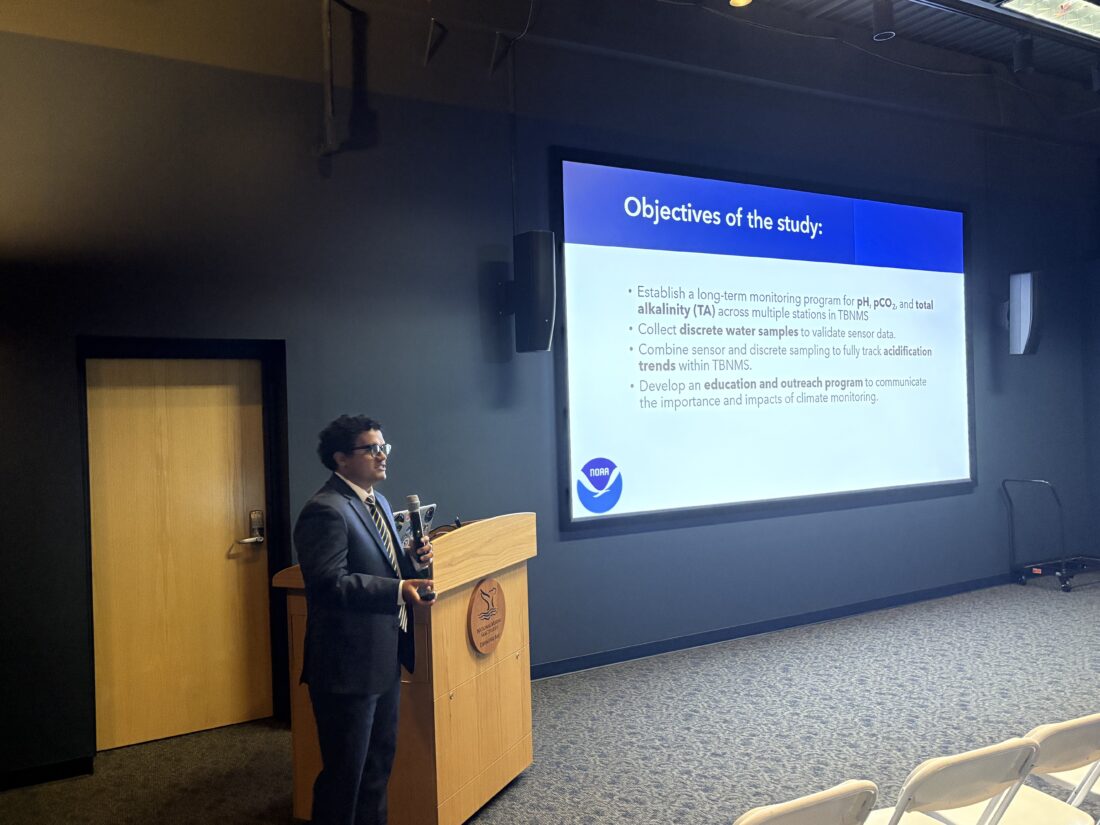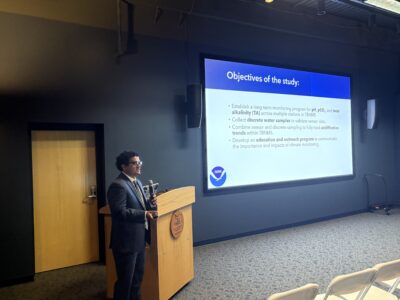TBNMS intern talks about Great Lakes acidification

News Photo by Kayla Wikaryasz On Wednesday, Luis Acevedo-Soto is seen at the Great Lakes Maritime Heritage Center presenting research he conducted during his internship with the Thunder Bay National Marine Sanctuary. Acevedo-Soto is a rising senior at the University of Puerto Rico and a Ernest F. Hollings Scholarship recipient.
ALPENA — Luis Acevedo-Soto, Thunder Bay National Marine Sanctuary’s Ernest F. Hollings Scholarship intern and rising senior at the University of Puerto Rico, gave updates in a lecture on Wednesday on his research at the sanctuary and the freshwater acidification project.
Acevedo-Soto has interned at TBNMS for two months and is preparing to present his research in Washington D.C. in conjunction with the National Oceanic and Atmospheric Agency (NOAA). There he will discuss how he contributed to TBNMS’ ongoing freshwater acidification monitoring project.
According to TBNMS, the freshwater acidification monitoring project is a response to a lack of data concerning acidification in the Great Lakes. Results from this project will inform future studies into climate-related impacts and TBNMS resources. TBNMS also states that the monitoring project will improve understanding of acidification and potential impacts on the Great Lakes ecosystem.
In his presentation at the Great Lakes Maritime Heritage Center, Acevedo-Soto explained that the freshwater acidification monitoring project is important because it tracks how pH levels in the Great Lakes can potentially affect the food web. Acidic water breaks down calcium carbonate which makes up shells of organisms in the Great Lakes.
“Calcium carbonate is the first compound of the creation of shells,” Acevedo-Soto said. “For every organism, for example, muscles or some types of plankton … these organisms are super important for the food web. If we are reducing the population of them, we are going to affect the entire food chain… that will directly affect the fish.”
Acevedo-Soto noted that if the Great Lakes continue to become more acidic, then not only will the environment be affected but so will the economy since fishing, commercial and recreational, contributes largely to Michigan’s economy.
Overall, Lake Huron has an average pH level of 8.1, according to Acevedo-Soto. He stated that this average makes Lake Huron a “base” on a pH scale, and any deviation in pH levels can impact the Great Lakes ecosystem.
“Organisms here are adapted to this environment,” he said. “Small changes in the pH can be terrible.”
Acevedo-Soto stated that he collected samples from seven TBNMS sites for his research. His conclusion from analyzing the samples is that there is a “slight decreasing trend in pH” at greater depths in Lake Huron. According to Acevedo-Soto, this may indicate ongoing acidification trends in the Great Lakes.
In addition to his findings, Acevedo-Soto noted that factors such as depth, temperature, and “biological activity” influences the chemistry of the Great Lakes. As the summer months wear on and the water gets warmer, he explained that the pH levels decrease (i.e., it becomes more acidic).
“This can be because the microbial respiration and the photosynthetic processes are improving … that also helps the CO2 to be dissolved,” Acevedo-Soto said. “So that makes the water more acidic.”
He noted that Lake Huron’s water becomes more acidic at greater depths due to less CO2 being dissolved and less mixing of water.
Globally, Acevedo-Soto explained that acidification has become a concern in both freshwater and saltwater environments. In the ocean, coral reefs are directly impacted by acidification. Acevedo-Soto said he had the opportunity to intern in the Caribbean, but recognized the lack of research on acidification in freshwater systems.
“There’s more research on acidification in the ocean … the problem is actually in the freshwater environments,” Acevedo-Soto said.
Acevedo-Soto stated that interning at TBNMS was his top choice for his scholarship.
After Acevedo-Soto graduates from university, he will begin studying for the Medical College Admission Test (MCAT) and pursue a doctoral degree. After graduation, he plans to take a gap year to dedicate to research.
Kayla Wikaryasz can be reached at 989-358-5688 or kwikaryasz@TheAlpenaNews.com.



